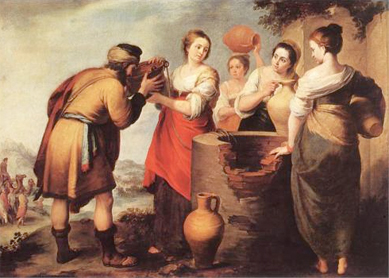The larger narrative of Israel’s journey to the land of promise includes the account of Zelophehad’s daughters: Mahlah, Noah, Hoglah, Milcah, and Tirzah. Although the etymologies of the daughters’ names are disputed, this story offers a glimpse into ancient Israelite inheritance customs. The story unfolds in three sections across two books of the Bible. The first section sets up the characters and introduces a potential problem (
What’s the Problem?
While settled in the plains of Moab, the Israelite leader Moses takes a census of the community that establishes how the Israelite families will receive land allotments. Property was the primary way families sustained themselves in agrarian societies like ancient Israel, because families consumed and sold food grown on the land. Those who controlled land also possessed legal rights to the things associated with the property, such as rents, goods and services, and labor. Importantly, Israelite inheritance was patrilineal, meaning, the land transferred from father to son. In this way, Israelite communities retained control of land within kin groups.
By the time Moses distributes the land, the Israelite Zelophehad has died with no male heirs to inherit his property allotment. Since the Israelites divided the land among male heads of households, Zelophehad’s daughters had to petition on behalf of their father. In unison, the daughters asked, “Why should the name of our father be taken away from his clan because he had no son? Give to us a possession among our father’s brothers” (
The story of Zelophehad’s daughters is intriguing because it sets precedence for the inheritance of daughters in ancient Israel. Yet, the inheritance of Zelophehad’s daughters is problematic because it disrupts the social order in ancient Israel, which stipulates the retention of landed property among the men within the kin group.
What’s the REAL Problem?
After the Lord directs Moses to give the land to the daughters, the elders of the Manasseh tribe worry that another tribe will amass more land than them if the daughters marry outside their tribe. To address this problem, Moses issues the following command regarding the daughters: “Let them marry whom they think best; only it must be into a clan of their father’s tribe that they are married so that no inheritance of the Israelites shall be transferred from one tribe to another; for all Israelites shall retain the inheritance of their ancestral tribes. Every daughter who possesses an inheritance in any tribe of the Israelites shall marry one from the clan of her father’s tribe, so that all Israelites may continue to possess their ancestral inheritance” (
The Saga Continues
Careful readers of
The story of Zelophehad’s daughters, demonstrates that Israelite daughters could inherit property—even if only to hold it in trust to pass on to their sons. Moreover, the story of the five daughters of Zelophehad provides fodder for various discussions in the history of interpretation including those centered around female cooperation, patriarchal limitations, and divine justice.
Bibliography
- Newman, M. “Mahlah” IDB 3:227.
- Ben-Barak, Zafrira. Inheritance by Daughters in Israel and the Ancient Near East: A Social, Legal and Ideological Revolution. Jaffa: Archaeological Center Publications, 2006.
- Meyers, Carol. Rediscovering Eve: Ancient Israelite Women in Context. New York: Oxford University Press, 2012.



